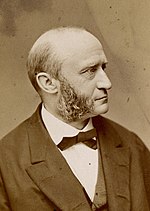Ernst Wilhelm von Brücke
Ernst Wilhelm von Brücke | |
|---|---|
 Ernst von Brücke. | |
| Born | 6 July 1819 |
| Died | 7 January 1892 (aged 72) |
| Nationality | Germany |
| Known for | Psychodynamics |
| Scientific career | |
| Fields | Physiology |
Ernst Wilhelm Ritter von Brücke (6 July 1819 – 7 January 1892) was a German physician and physiologist. He is credited with contributions made in many facets of physiology.
Biography
He was born Ernst Wilhelm Brücke in Berlin. He graduated in medicine at the University of Berlin in 1842, and during the following year, he became a research assistant to Johannes Peter Müller. In 1845 he founded the Physikalische Gesellschaft (Physical Society) in Berlin, together with Emil Du Bois-Reymond, Hermann von Helmholtz and others, in the house of physicist Heinrich Gustav Magnus. Later on, this became known as the Deutsche Physikalische Gesellschaft (German Society of Physics). In 1846, Brücke was elected teacher of anatomy in the Akademie der Bildenden Künste, in Berlin. Following that, in 1848 he was appointed as professor of physiology at the University of Königsberg, replacing Karl Friedrich Burdach (1776–1847). In 1849 he acquired similar duties at the University of Vienna. In 1873, Emperor Franz Joseph I honored Brücke with a noble title- von Brücke- but the physiologist rarely used it.
Ernst Fleischl von Marxow (1846–1891), and Joseph Paneth (1857–1890), two colleagues of Freud, were also assistants to Brücke in Vienna, however Brücke is most noted for his influence on Sigmund Freud, one of his other medical students. Freud began studying under Brücke in 1877, and continued doing so until 1883. He was tasked to examine the biology of nervous tissue, specifically comparing the brains of humans and other vertebrates to that of invertebrates. Freud would many times call Brücke the professor who shaped him the most. This influence led to the development of the science of psychodynamics. Brücke's teachings did not only influence Freud's work; parts of the noted psychologist's theory were pulled directly from his professor's principles, specifically the idea that all living things are dynamic and must bow to the laws of chemistry and physics.
Brücke retired from the University of Vienna in the September of 1890 and began working on a book he had long planned to write: Beauty and the Flaws of the Human Stature, which ended up being published as The Human Figure: Its Beauties and Defects.
Brücke is remembered for his research on the nature of cells, work dealing with the physiology of language, investigations on the effect of electricity on muscles and studies of albumin. His work in the science of optics was instrumental towards Helmholtz's invention of the ophthalmoscope. He also made significant contributions in the fields of physics, plant physiology, microscopic anatomy and experimental physiology.
Selected works
- Ueber die Bewegungen der Mimosa pudica. Archiv für Anatomie, Physiologie und wissenschaftliche Medicin: 434-455 (1848) -- On the movements of Mimosa pudica.
- Beiträge zur vergleichenden Anatomie und Physiologie des Gefässsystems. Denkschriften: Akademie der Wissenschaften Wien, Mathematisch-Naturwissenschaftliche Classe 3: 335-367 (1852) -- Contributions to the comparative anatomy and physiology of the vascular system.
- Grundzüge der Physiologie und Systematik der Sprachlaute für Linguisten und Taubstummenlehrer. Wien: C. Gerold & Sohn (1856) -- Fundamentals of physiology and classification of speech sounds for linguists and deaf teachers.
- Die Elementarorganismen. Sitzungsberichte der Mathematisch-Naturwissenschaftlichen Classe der Kaiserlichen Akademie der Wissenschaften 44: 381-406 (1861) -- Elementary organisms.
- Die Physiologie der Farben für die Zwecke der Kunstgewerbe. Leipzig: S. Hirzel (1866) -- The physiology of colors for the purposes of the arts.
- Die physiologischen Grundlagen der neuhochdeutschen Verskunst. Wien: C. Gerold & Sohn (1871)
- Vorlesungen über Physiologie -- Lectures on physiology.:
- 1. 2., verm. u. verb. Aufl. 1875 Digital edition by the University and State Library Düsseldorf
- 1. Physiologie des Kreislaufs, der Ernährung, der Absonderung, der Respiration und der Bewegungserscheinungen. 3., verm. u. verb. Aufl. 1881 Digital edition by the University and State Library Düsseldorf
- 2. Physiologie der Nerven und der Sinnesorgane und Entwickelungsgeschichte. 2., verm. u. verb. Aufl. 1876 Digital edition by the University and State Library Düsseldorf
- 2. Physiologie der Nerven und der Sinnesorgane und Entwickelungsgeschichte. 3., verm. u. verb. Aufl. 1884 Digital edition by the University and State Library Düsseldorf
- 2 : S/S. 1886. Physiologie der Nerven und der Sinnesorgane und Entwickelungsgeschichte. 4., verm. u. verb. Aufl. 1887 Digital edition by the University and State Library Düsseldorf
Notes
Regarding personal names: Ritter is a title, translated approximately as Sir (denoting a Knight), not a first or middle name. There is no equivalent female form.
External links
- Ernst Wilhelm Ritter von Brücke. WhoNamedIt.
- Biography and bibliography in the Virtual Laboratory of the Max Planck Institute for the History of Science
- The Human Figure: Its Beauties and Defects. In the Preface by William Anderson.
- Freud was a pioneering neuroscientist. From the newspaper The Guardian.
